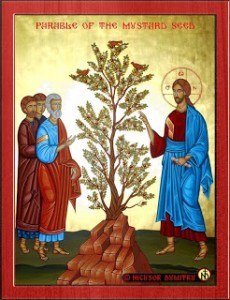Thoughts on Today’s Lessons for Sunday, July 27, 2014
First Reading: Genesis 29:15-28This reading hits us with one eye-popping surprise after another. First, tricky Jacob gets tricked in his turn by Laban, who puts him to work for seven years to earn Laban’s daughter Rachel as his bride. But Laban switches in his older daughter, Leah, much to Jacob’s consternation. Then, not only does Jacob eventually marry Rachel, too, but Rachel’s and Leah’s maids! So much for “biblical marriage”! It’s difficult to understand Scripture’s seemingly casual acceptance of arranged, polygamous marriages, with the women given no opportunity to participate or object. Perhaps it’s best to view these “ancestral legends” as products of their time and culture, yet timeless metaphors that celebrate God’s faithfulness in ensuring that Abraham’s children will populate all nations.
First Reading (Track Two): 1 Kings 3:5-12
Most of us probably know King Solomon best through the ancient story telling how he quickly discerned the real mother in two women’s dispute over a baby by proposing to cut the infant in half. Here we meet Solomon as the youthful new king, still uncertain and uneasy. Offered in a dream whatever gift he desires God to give him, Solomon does not ask for long life, riches or power, but the wisdom to govern the people wisely. Pleased, God grants him a wise and discerning mind surpassing any king who came before or after him.
Psalm: Psalm 105:1-11, 45b
Indeed, today’s Psalm, a ringing hymn of praise to God and God’s works, offers thanksgiving for just the reward that the story of Laban’s daughters foretells: God made an everlasting covenant with Abraham, Isaac and Jacob. God promises that their children would inherit the Promised Land for a thousand generations, in return for their covenant to follow God’s teaching and obey God’s laws.
Psalm (Track Two): Psalm 119:129-136
With its 176 verses, this is the longest of all the Psalms. From end to end it tells the Psalmist’s love and praise for God’s Law, God’s covenant with the people. Note well that the word “Law” here is the Hebrew “Torah,” the first five books of the Bible. Torah is understood as God’s teaching, God’s expression of God’s desire for us to live in good relationship with God and each other. Try reading these verses with “God’s teaching” in place of “laws, commandments and decrees,” and feel the difference.
Second Reading: Romans 8:26-39
Our two-month journey through Paul’s extended theological exposition to the Romans continues today with a beautiful illustration of God’s love made manifest through God’s gift to us of God’s own son. God’s eternal faithfulness, held up for us in the Genesis reading and Psalm, is celebrated again in Paul’s assurance that, even in the face of persecution, nothing in all creation can separate us from the love of God through Jesus.
Gospel: Matthew 13:31-33, 44-52
What is the kingdom of heaven like? Jesus offers us quick, thought-provoking glimpses in a quick series of parables. The kingdom is like a tiny mustard seed that grows into a mighty tree! Or yeast that leavens bread! But wait, it’s like buried treasure? A merchant with an expensive pearl? Fishers with a full net? And there’s that scary threat of the fiery furnace again, with weeping and gnashing of teeth that awaits evildoers. When Jesus asked the apostles if they understood, they said yes. Do you think that they really did?

